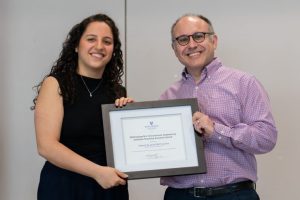Hadas Elazar-Mittelman MS’23, a third-year materials science and engineering PhD candidate and a representative in the Ralph O’Connor Sustainable Energy Institute (ROSEI) Graduate Student Association, is the winner of this year’s George M.L. Sommerman Engineering Graduate Teaching Assistant Award, which recognizes her excellence in instruction, success in instilling the desire to learn, and dedication to undergraduate students. It is part of the Whiting School’s 2024 Excellent in Teaching, Advising, and Mentoring awards.
Elazar-Mittelman discovered a passion for education when she was in high school. “I was a member of the tutoring club and would volunteer to tutor other students during lunch,” she says. “I enjoyed that, so I started meeting with students privately and consistently throughout the week.”

Hadas Elazar-Mittelman MS’23 and her advisor, Professor Jonah Erlebacher
With initial aspirations to be a teacher, she started in the University of Maryland’s Terrapin Teachers program before switching to the materials science and engineering program. She earned her Master of Science in Engineering (MSE) last year.
At the Whiting School, Elazar-Mittelman has applied her talents as a teaching assistant for two courses: the introductory “Foundations of Materials Science and Engineering” class and “Phrase Transformation of Materials,” a graduate-level kinetics course.
“I interact with students on both ends of their college education: I teach one of the first classes freshman take, and one of the last classes for graduate students,” she says.
Her approach to teaching is informed by the needs of the students. She empathizes with the challenges first-year students face and aims to help with their struggles as they transition into college life.
“There was a mentorship component to working with freshmen… I had to teach them complex engineering topics at a basic level while showing them how to structure their homework and schedule their week,” says Elazar-Mittelman.
She also understands the demands of earning an advanced degree. She relates the graduate curriculum to potential careers and qualifying exams, comprehensive oral assessments that are critical to obtaining a PhD.
“I always tied doctorate coursework to examples in research and industry, with the ultimate goal of passing their qualifying exams,” she says. “I think they appreciated our discussions.”
Those efforts have not gone unnoticed; According to one of Elazar-Mittelman’s advisors, Materials Science and Engineering Professor and ROSEI core faculty member Jonah Erlebacher, “Many students have told me how Hadas helped review and solidify the concepts associated with complicated topics like X-ray diffraction, leading to better understanding. Now a year later, students still tell me how great she was as a TA.”
Beyond the classroom, Elazar-Mittleman organized comprehensive review sessions as the director of department engagement for the Materials Graduate Society (MGS). She now serves as co-president of MGS and leads the Hopkins Catalysis Club (HCC).
Her diverse teaching experiences deepened her understanding of engineering instruction, and she learned that there is more to teaching complicated scientific topics than lectures and homework.
“Community building is a huge part of teaching,” says Elazar-Mittelman. “When I was online learning during my master’s program, I missed having a learning community. Becoming a TA has allowed me to foster connections and improve my communication skills by explaining difficult concepts to young students. It’s made me a better student and added to my overall experience as an engineer at Hopkins.”
A ROSEI scholar, Elazar-Mittelman is co-advised by Erlebacher and Michael Tsapatsis, professor of chemical and biological engineering—both affiliated with ROSEI.
This story was written by Conner Allen and originally appeared on the Department of Materials Science website.
